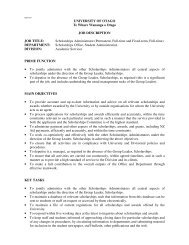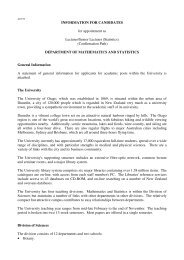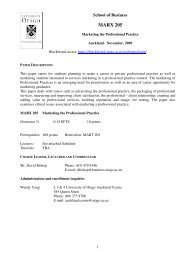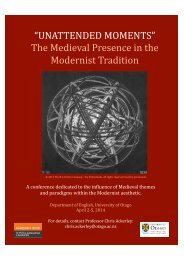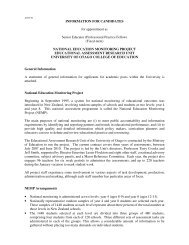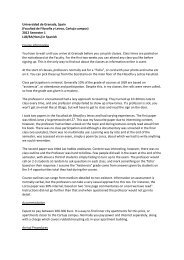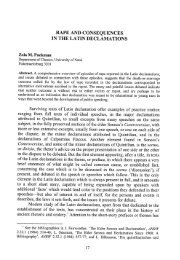CREATIVE IMITATIONS AND APPROPRIATIONS - University of Otago
CREATIVE IMITATIONS AND APPROPRIATIONS - University of Otago
CREATIVE IMITATIONS AND APPROPRIATIONS - University of Otago
You also want an ePaper? Increase the reach of your titles
YUMPU automatically turns print PDFs into web optimized ePapers that Google loves.
male-dominated industry in which films <strong>of</strong>fered stories <strong>of</strong> aggression, stunts,<br />
pranks and subversion.” In contrast, New Zealand film historian Bruce Babington<br />
underlines that “[b]y 1985 the beginnings <strong>of</strong> a perceptible feminisation <strong>of</strong> New<br />
Zealand film are observable, not only in subject matter and emphases, but in<br />
directing personnel.” This presentation proposes to explore this “feminisation” as<br />
a form <strong>of</strong> collective memory that arises, at least in part, out <strong>of</strong> the concerns <strong>of</strong><br />
second wave feminism, serving to de-stabilize accepted national myths about<br />
“God’s own country.”<br />
Kluge, Eisenstein and Marx: Filming Das Kapital<br />
Simon Ryan<br />
In his 580-minute DVD project Nachrichten aus der ideologischen Antike (2008)<br />
Alexander Kluge engages with the relationship between text and image in the<br />
context <strong>of</strong> Eisenstein’s unrealised plan to film Marx' Das Kapital. Vilém Flusser’s<br />
observations on the nature <strong>of</strong> film code point the way to a productive continuation<br />
<strong>of</strong> the conversation between Kluge and Oskar Negt on the question <strong>of</strong> an aporia<br />
between text and image.<br />
The Battle <strong>of</strong> Thermopylae: Herodotus’ Histories and 300<br />
(2007)<br />
Matthew Sibley<br />
The Battle <strong>of</strong> Thermopylae <strong>of</strong> 480BC is a celebrated moment in Greek history<br />
and Classical scholarship. The battle, in which a Greek contingent held <strong>of</strong>f a<br />
numerically superior Persian force for several days, has captivated the minds <strong>of</strong><br />
historians, writers, artists and filmmakers since its occurrence. The Father <strong>of</strong><br />
History, Herodotus, is our most popular ancient account <strong>of</strong> the event in the 7th<br />
book <strong>of</strong> his work The Histories. The event has subsequently had a strong<br />
tradition in visual culture and film.<br />
Zach Snyder’s rendition, 300 (2007), has proved divisive with critics and<br />
scholars. Contentious elements <strong>of</strong> the film include its historical inaccuracies,<br />
depiction <strong>of</strong> the Persian force as monstrous, and simplification <strong>of</strong> the battle to a<br />
contest <strong>of</strong> good against evil, and democracy against despotism. Some scholars<br />
have defended the film on the basis that it should be read as a reinterpretation <strong>of</strong><br />
Herodotus’ literary work, rather than a purely historical film. I will follow in this line<br />
but with one amendment; the depiction <strong>of</strong> King Xerxes is antithetical <strong>of</strong><br />
Herodotus’ literary objective and requires an examination <strong>of</strong> the wider Classical<br />
tradition.<br />
13




